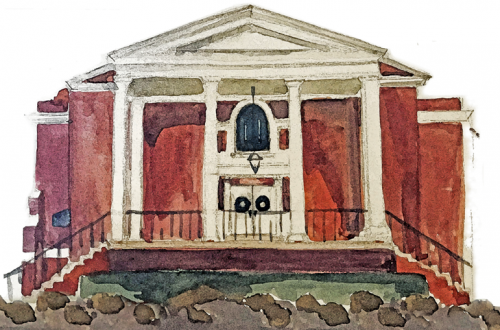 A couple of the commenters on my previous post have asked what my thoughts are on the gender debates. So I am happy to accommodate and to describe my own convictions on this seminal issue.
A couple of the commenters on my previous post have asked what my thoughts are on the gender debates. So I am happy to accommodate and to describe my own convictions on this seminal issue.
In short, I am a complementarian. That is, I believe that “God has created men and women equal in their essential dignity and human personhood, but different and complementary in function with male headship in the home and believing community, God has created men and women with distinct but complementary roles.â€
So I affirm that the scriptures teach that all men and women are created in the image of God with equal dignity before God. Christian women and men are indeed “fellow-heirs of the grace of life†(1 Peter 3:7) and have an equal share in the blessings of salvation (e.g., Galatians 3:28).
Yet God has created man and woman to have distinct roles in the church and in the home. These distinctions of masculine and feminine roles are ordained by God as part of the created order and are not a result of the fall (e.g., Genesis 2:16-18, 21-24).
The Old and the New Testaments reveal a principle of male headship in the family and in the church (e.g., Ephesians 5:21-33; 1 Timothy 2:11-15). This means that there is a Biblically prescribed patriarchy that must be observed in the church and in the home.
The brevity of this explanation leaves much to be desired and in fact may raise more questions than it answers. So I direct the interested reader to The Danvers Statement for a fuller description of what I believe the Bible teaches about gender.
In the current evangelical gender debates, I am very concerned that egalitarians are marshalling exegesis and hermeneutical approaches that distort the Bible’s teaching on gender. These distortions affect not merely the gender question, for the gender debate is inextricably related to the way one understands the Trinity (e.g., 1 Corinthians 11:1-3) and the Gospel itself (Ephesians 5:32).
I believe Russell Moore’s essay is important because it describes a leftward tilt among the so-called “evangelical†femininists. If not in this generation of “evangelical†femininist approaches, I suspect that succeeding generations of “evangelical†femininists will lay aside commitment to the evangelical doctrine of inerrancy.
This appears to be the current trajectory of egalitarian thought, and it is troubling indeed.




7 Comments
sofyst
This means that there is a Biblical prescribed patriarchy that must be observed in the church and in the home.
Oh well, thats not very fair! 😉
sophigirl
First of all, thanks for including Dr. Duncan’s lecture in your post – I found it very helpful.
Second, along with you I am concerned about the left tilt of the egalitarian movement. Here is my question, though – why are these women going extreme? To say, “because of our sinful culture, etc.” is to point only half of the issue. I am convinced that the way we, as evangelicals, treat this issue is also a part of the problem.
It is true that good, sound teaching on the topic, as represented by Dr. Duncan, has come out of evangelical tradition. However, it is also true that IN PRACTICE we still don’t know how to handle the “women” in the church. Take Criswell, for example. Every time you hear admonitions from the pulpit to the future “workers of the kingdom,” they are addressed to the men in the audience – future pastors, preachers, and evangelists. Then, in a jest of what feels as an attempt of being politically correct, you hear women added to this list, as future pastors’ wives, children’s workers, and missionaries. Every time I hear a similar statement, I cannot help but be on the edge of my sit with frustration. Am I to think that girls of Criswell go through all of the requirements of biblical degree just to get themselves a husband, or to sing songs with little children in the Sunday school?! (this is another hot issue for me, by the way – the quality of teaching in our Sunday schools)
Don’t get me wrong – I don’t think it beneath me to teach children, or to be a devoted wife who supports her husband’s ministry – I volunteer in the nursery and do hope to get married one day :). I think these to be a noble and needed service and calling. What frustrates me is the ATTITUDE that is showing itself in this treatment of the topic. It’s this comradery of preacher boys, when a speaker or a guest pastor automatically gives guys his full attention, all but ignoring girls who might also have questions for him, it’s the patting each other on the backs, and so on, and so on. It’s the fact that if I want to learn things of theology or philosophy I have to squeeze my way into a men’s circles and prove to them that I have a right to ask questions.
And then there is frustration with my own sex, with our complacency and willingness to leave thinking to men. The attitude that just because I am a woman, I don’t have to think about “deep” stuff. Anyway… you can see that this topic is a heated one for me. And though I don’t support the feminist movement in any way, there is a part of me that’s sympathetic to them.
Denny Burk
Dear Alina,
I am completely sympathetic to your concerns. I think Southern Baptists have dropped the ball on this one. We can get so busy saying what we are against without ever getting to what we are for.
So I direct you to one line from the Danvers Statement that is very important to me: “no man or woman who feels a passion from God to make His grace known in word and deed need ever live without a fulfilling ministry for the glory of Christ and the good of this fallen world (1 Cor 12:7-21).”
Among other things, complementarians need to be promoting venues for Christian women to exercise their gifts within the body. Many women in our churches are gifted teachers, and the body suffers when we don’t put them to work in using their gifts.
I don’t have in mind mainly children’s ministry. I am thinking in particular of women’s ministry. Many of the independent Bible churches in the Dallas area, for instance, have women’s ministry directors who are full-time staff members of the church (e.g., my friend Jean Klughart at Denton Bible Church or the various women’s staff at Irving Bible Church).
These women are not starving for serious opportunities to teach and disciple. We need to be looking for the same opportunities for women in Southern Baptist life.
sofyst
Alina said:
It’s the fact that if I want to learn things of theology or philosophy I have to squeeze my way into a men’s circles and prove to them that I have a right to ask questions.
If only you knew how many actually see you as one to whom the questions should be asked.
RosieBoo
As a co-leader of our women’s ministry at my church, I’ll speak from the female complementarian viewpoint. I’m single and hope one day to marry the man God has for me, but in the meantime, I serve on. There is a huge (empahsis on HUGE) need in local churches of all sizes for quality women’s ministry based on the foundation of the word. I have met many leaders from churches across the country that define women’s ministry as quilting bees and scrapbooking sessions with no Bible study at all. Although we are relational creatures, women desperately need to learn the Word. Women can reach women in many ways better than men.
To the point on teaching children….I’ve sat on panels for youth girls events as a speaker. If you don’t feel called to children, I urge you to make a difference in a teenager’s life. They are confronted with not only premarital sex but homosexuality and every sin in the world. Dr. Moore has stated, “Women’s Ministry begins at the cradle.” We can never start training too young.
I find this a tremendously high calling…and one that God created for me, the woman.
Denny Burk
Amen, Rose! Contrary to the opinion of many, women’s ministry is not all potlucks and ponytails. It is about discipleship in the Word of God. Preach on, Rose!
Pingback: